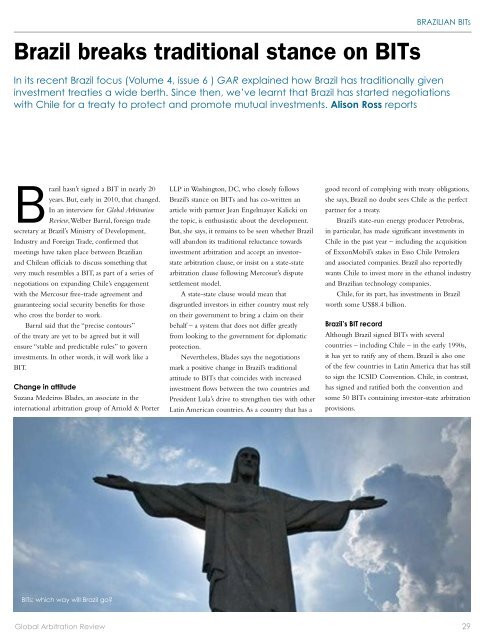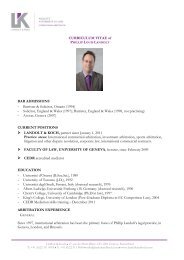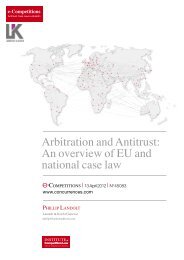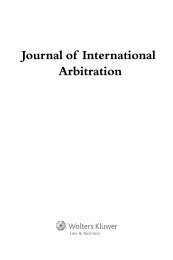Known
View Document - Landolt & Koch
View Document - Landolt & Koch
You also want an ePaper? Increase the reach of your titles
YUMPU automatically turns print PDFs into web optimized ePapers that Google loves.
Brazil breaks traditional stance on BITs<br />
BRAZILIAN BITS<br />
In its recent Brazil focus (Volume 4, issue 6 ) GAR explained how Brazil has traditionally given<br />
investment treaties a wide berth. Since then, we’ve learnt that Brazil has started negotiations<br />
with Chile for a treaty to protect and promote mutual investments. Alison Ross reports<br />
Brazil hasn’t signed a BIT in nearly 20<br />
years. But, early in 2010, that changed.<br />
In an interview for Global Arbitration<br />
Review, Welber Barral, foreign trade<br />
secretary at Brazil’s Ministry of Development,<br />
Industry and Foreign Trade, confirmed that<br />
meetings have taken place between Brazilian<br />
and Chilean officials to discuss something that<br />
very much resembles a BIT, as part of a series of<br />
negotiations on expanding Chile’s engagement<br />
with the Mercosur free-trade agreement and<br />
guaranteeing social security benefits for those<br />
who cross the border to work.<br />
Barral said that the “precise contours”<br />
of the treaty are yet to be agreed but it will<br />
ensure “stable and predictable rules” to govern<br />
investments. In other words, it will work like a<br />
BIT.<br />
Change in attitude<br />
Suzana Medeiros Blades, an associate in the<br />
international arbitration group of Arnold & Porter<br />
LLP in Washington, DC, who closely follows<br />
Brazil’s stance on BITs and has co-written an<br />
article with partner Jean Engelmayer Kalicki on<br />
the topic, is enthusiastic about the development.<br />
But, she says, it remains to be seen whether Brazil<br />
will abandon its traditional reluctance towards<br />
investment arbitration and accept an investorstate<br />
arbitration clause, or insist on a state-state<br />
arbitration clause following Mercosur’s dispute<br />
settlement model.<br />
A state-state clause would mean that<br />
disgruntled investors in either country must rely<br />
on their government to bring a claim on their<br />
behalf – a system that does not differ greatly<br />
from looking to the government for diplomatic<br />
protection.<br />
Nevertheless, Blades says the negotiations<br />
mark a positive change in Brazil’s traditional<br />
attitude to BITs that coincides with increased<br />
investment flows between the two countries and<br />
President Lula’s drive to strengthen ties with other<br />
Latin American countries. As a country that has a<br />
good record of complying with treaty obligations,<br />
she says, Brazil no doubt sees Chile as the perfect<br />
partner for a treaty.<br />
Brazil’s state-run energy producer Petrobras,<br />
in particular, has made significant investments in<br />
Chile in the past year – including the acquisition<br />
of ExxonMobil’s stakes in Esso Chile Petrolera<br />
and associated companies. Brazil also reportedly<br />
wants Chile to invest more in the ethanol industry<br />
and Brazilian technology companies.<br />
Chile, for its part, has investments in Brazil<br />
worth some US$8.4 billion.<br />
Brazil’s BIT record<br />
Although Brazil signed BITs with several<br />
countries – including Chile – in the early 1990s,<br />
it has yet to ratify any of them. Brazil is also one<br />
of the few countries in Latin America that has still<br />
to sign the ICSID Convention. Chile, in contrast,<br />
has signed and ratified both the convention and<br />
some 50 BITs containing investor-state arbitration<br />
provisions.<br />
BITs: which way will Brazil go?<br />
Global Arbitration Review 29





